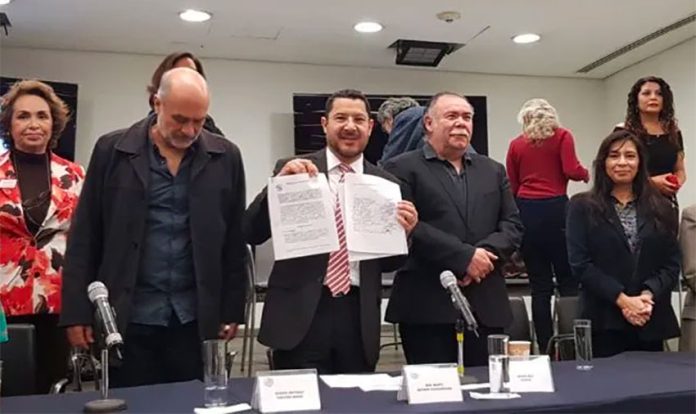A ruling party senator has presented a bill that proposes the compulsory dubbing of all foreign-language films into Spanish as well as widely-spoken indigenous languages.
Put forth by Martí Batres, leader of the Morena party in the upper house, the draft legislation would make changes to the Federal Cinematography Law.
The bill states that all films whose original language is not Spanish must be dubbed and shown on the same number of cinema screens as the original in a multi-screen theater.
Under the proposal, a movie theater screening a Japanese film at 2:00pm on one screen would be required to show the same film dubbed into Spanish at the same time on another screen.
It would also have to offer at least one screening per day of the film dubbed into the predominant indigenous language of the region – Mayan in the Yucatán peninsula, for example. The same rule would apply for Spanish-language films – theaters must screen the film dubbed into the main indigenous language at least once per day while the original is playing.
Taking into account suggestions made by the Mexican Voice Actors Guild, the bill aims to increase the amount of work available in the dubbing industry, improve the conditions of its workers and promote national culture by making more films available in Spanish and indigenous languages.
“Voice actors aren’t even recognized in the Federal Labor Law nor by copyright law,” Batres said Thursday during an appearance on the television program La Nota Dura.
He claimed the conditions under which many voice actors work are “precarious,” adding: “They work in cabins without air conditioning. Their work status should be raised.”
The senator stressed that the bill doesn’t seek to impose dubbed films on cinema-goers but rather give them the option to choose between the original and a version with Mexican Spanish audio. Countries such as France and Spain defend their languages but Mexico doesn’t, Batres said.
“In Spain, for example, they even dub the movies that arrive already in Spanish,” he said, apparently referring to films from Latin America in which the Spanish spoken differs from the Iberian variety.
On the same program, the secretary general of the National Actors Association offered his support for the bill.
“Voice actors have been ignored. There are more than 10,000 families that depend on the industry,” Marco Treviño said.
However, the newspaper El Economista noted that the bill goes against the wishes of the Mexican Academy of Cinematographic Arts and Sciences (AMACC), which opposes changes to the law as it currently stands.
It said that the public has the right to watch a film as it was originally conceived, charging that the right is violated if the script is changed and dubbed into another language.
By mandating that a film must be dubbed, private interests for the purpose of profit are given precedence over the public interest, the AMACC said.
Source: El Economista (sp), El Financiero (sp), Sopitas (sp)
